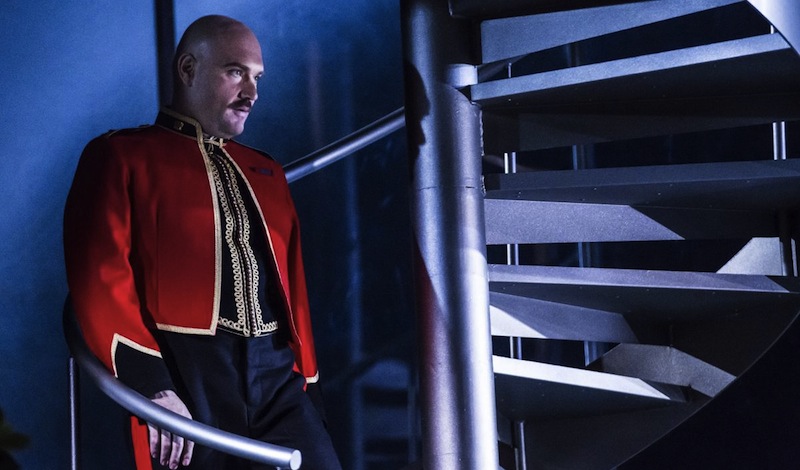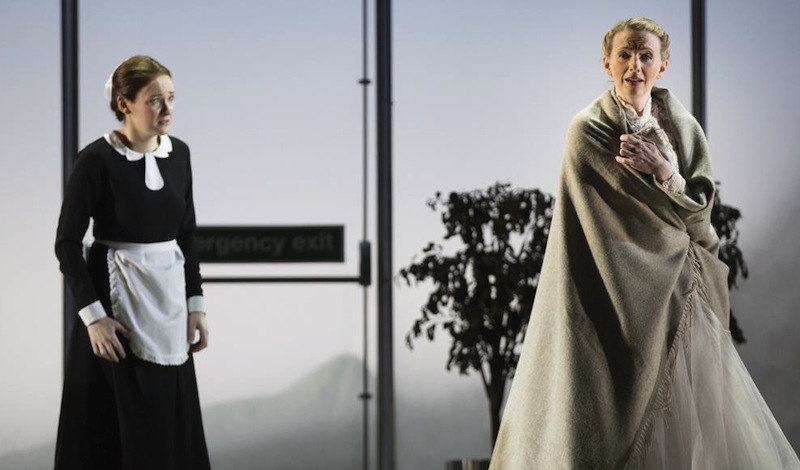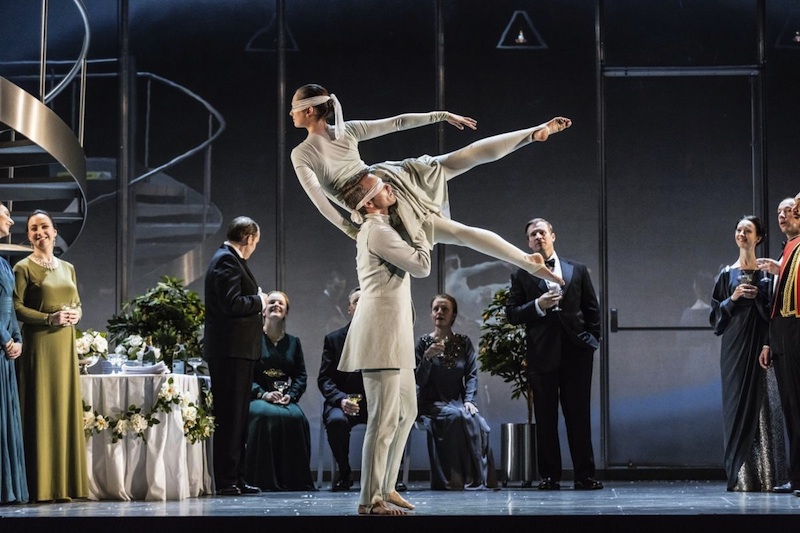Ariodante
★★★★☆ Joyous and satisfying
Festival Theatre: Wed 24, Sat 27 Feb 2016
Review by Thom Dibdin
Death hangs brooding low over Scottish Opera’s fine production of Handel’s Ariodante, at the Festival theatre for a sadly limited run.
It twitches from a gibbet in the opening tableaux, with a pair of corpses still in their final death throws. And it permeates the whole opera through the unyielding King James Bible verses printed across the stage cloth.
“If a man be found lying with a woman married to an husband, then they shall both of them die, both the man that lay with the woman, and the woman…”
That’s Deuteronomy 22, verse 22. And with the motto Trust in the Lord writ large above the stage, it is clear that here, in this place that we will discover to be a Knoxian Scotland, Moses’ laws on infidelity still come down hard.
Rather more ambiguous is the question of whether the opening tableaux is merely the backdrop to the unfolding events, or whether it also represents their outcome. It is a harsh ambiguity, one which drives into the heart of the production, over and above the beauty of Handel’s music and the subtly-tweeked new version of the libretto.
The plot is simple and bold. Ariodante, a soldier, has been accepted as Princes Ginevra’s betrothed. Not only does her father the king approve of Ariodante as heir to the throne, it is a love match. But his rival, Polinesso, tricks Ariodante into believing that Ginevra takes Polinesso into her bed.
emergency exit
It’s all set in a modern foyer of glass, marble and chrome – with an obviously marked emergency exit leading out onto snow-covered concrete visible through the plate glass wall.
There is a finely-judged balance from the orchestra under the baton of Nicholas Kraemer, and no little amount of drive, allowing it all to open up early. The tone for Act I is set by Ginevra, sung by Sarah Tynan with power and joy in her arias.
Caitlin Hulcup struts magnificently in the trouser role of Ariodante. Her voice is not quite as powerful as Tynan’s and there is perhaps a shade too much overcompensation in her stance, but the quality of their love is never in doubt and their duets proclaiming it soar as things of beauty.
The King (Neal Davies) quickly agrees to their marriage and the wedding date is set for the following day as the foyer is turned into a reception area to celebrate the fact. Harry Fehr’s direction, and Yannis Thavoris’ design allow the action to flow as smoothly as the music as the day progresses, tables are prepared and the party ensues.
The complications come fast, however. There is the unctuous Polinesso, Duke of Albany, who loves Ginevra for the fact that her husband will be king. Countertenor Xavier Sabata takes a scene or two to really emerge in the role, written for castrato, but is soon oozing the smug pride of those who believe they are entitled.
blind obedience
Sabata’s voice is a joy to hear, while his actions wind the plot darker and darker, with his abuse of Dalinda, Ginevra’s servant, who loves him. He at first scorns her, but then tricks her into dressing up as her mistress, to welcome him into her boudoir.
Against his malificent abuse, Jennifer France’s naive and sweet Dalinda purrs with longing, “how much more shall I love you when you embrace me?” she sings, reflecting on the bruises he has inflicted on her and encapsulating the chaotic logic of the abused down the ages.
The irony is that Lurcanio, Ariodante’s brother – created as a fine, upstanding fellow by Ed Lyon – is in love with Dalinda. Yet she spurns his advances.
Once set up, and Harry Fehr has made a few changes to the structure, moving sections around to remove chance encounter from the elements that drive the plot, this begins to enter similar areas to that are expressed in the current production of The Crucible at the Lyceum.
In the celebration of their betrothal, a ballet duet between two blindfolded dancers symbolises that love is blind. It is well done, not an intrusion but a logical step of the plot, with dancers Lucy Ireland and Vince Virr interpreting Kally Lloyd-Jones easy on the eye choreography.
But this blindness will return as blind obedience to an outmoded law; blind adherence to a religious ideal. Ariodante believes Polinesso’s trick and leaves by the emergency exit for suicide – only for his brother to accuse Ginevra for her supposed action and ask the King to condemn her to death.
It’s not accident that Antonio Salvi’s libretto for Ariodante, on which Handel based his opera, was originally called Ginevra. It is her tragedy, an innocent wrongfully accused, which consumes the whole of the action after the interval, into Act III.
The motif of blindness recurs in Fehr’s clever direction with the dancers returning at key moments. While that ambiguous question over the nature of the opening tableaux keeps on coming back, niggling into the consciousness that the triumphant happy ending might, in fact, by the death dream of a condemned woman.
It’s a question that allows tragedy and comedy to collide in soaring joy and unflinching sorrow. And makes for a thoroughly satisfying and thought-provoking piece of operatic entertainment.
Running time 3 hours 10 minutes (including one interval)
Festival Theatre, 13/29 Nicolson Street EH8 9FT
Wednesday 24 and Saturday 27 February 2015
Evenings: 7:15pm
Tickets and further details from Festival Theatre
http://www.edtheatres.com/ariodante
Scottish Opera website: www.scottishopera.org.uk
ENDS




















